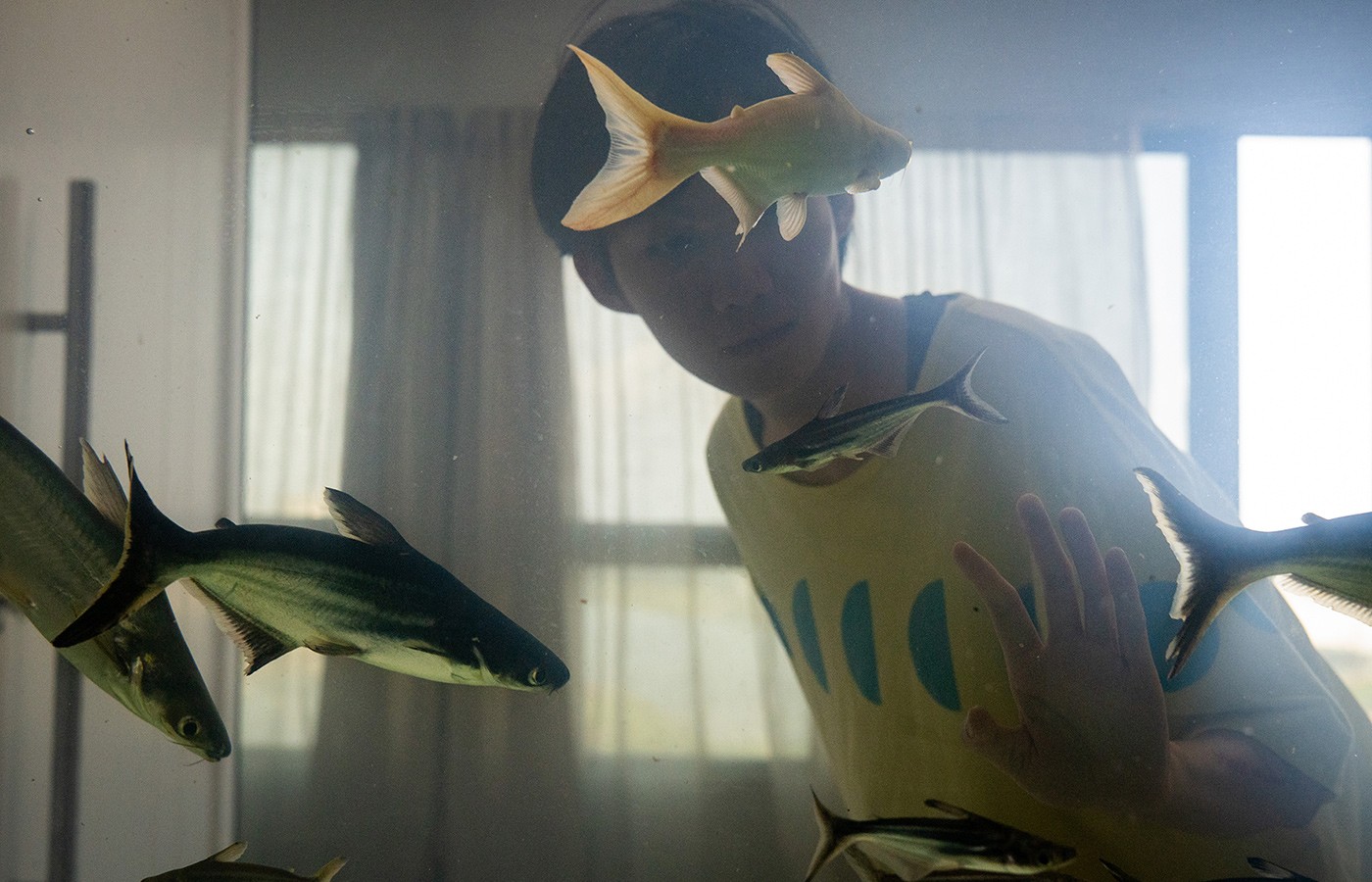Nele Wohlatz, how does a German filmmaker based in Buenos Aires get to make a film about Chinese workers in Brazil?
It all started with an anecdote Kleber Mendonça Filho, a Brazilian filmmaker, told me at the Vienna Film Festival in 2016. He’s from Recife, where the film is set. One day he told me about these Twin Towers — two identical towers where two worlds coexist: on the one hand there are the conservative upper-class Brazlians who live in luxury flats with their servants. But also, there are Chinese immigrants — because the towers are next to the historical center, which is very rundown and where a new immigration of Chinese arrivals started opening up small businesses, like those shops you see in the film. Some of them grew successful and bought apartments in those towers. They didn’t have servants, and instead they used the huge space to house the new arrivals — many workers were coming from the southwest Province of Fujian, at the time. And so they started to live there in big communities. And of course, the white, right wing, upper class Brazilians went completely nuts about it, because they had to share the common spaces — the elevators and the parking lots, but also the swimming pool and the party area with Chinese people from all kinds of backgrounds — some were successful businessmen other simple workers, but they wouldn’t speak Portuguese, so the Brazilians would not be able to tell who’s who. I just had the instinct that this could develop in a film…
At which point did you know it would be your next film? Did you go there?
Yes, I was invited as a jury in a film festival there in 2017, and I thought, okay, I need to come here with Zhang Xiaobin who had been the actress of my first film and helped me a lot with research and reaching out to Chinese people. And so I bought two flight tickets to go on a first research trip with Xiaobin in 2018. We stayed for four weeks and had long, long conversations with Chinese people, workers and business people in those towers. We came back with a lot of material and I started writing, and then a year later we went back and did some more weeks of research.
This feels like a documentary film approach. Did you even know what you were after?
Yes and no. I make feature films, but I’m also not a classic fiction person: I find stories in everyday life or in a given situation, and then my film starts developing from the reality I find there, within a long research. You go and you try to understand what’s going on and you gather the material… One of my teachers at the Karlsruhe media arts school was the documentary filmmaker Thomas Heise, and I guess this too influenced my approach to film.
Interestingly your cast reflects this ambivalence between fiction and documentary. You have a few professional actors, but it’s mostly non professional actors and people playing their own roles… Why choose so many non-professional actors?
I’m so fascinated with working with non-professional actors. I usually write the script for them. And then it becomes a very hybrid process where we rehearse and I keep writing — because I need to find out how far we can get, what they are able to do, to continue developing their characters. They become actors of their own lives. And every now and then we enter this zone where I really don’t know anymore if they are playing with the acting tools that we developed or if they are just being themselves. And then something very truthful and beautiful happens. Like the scene where Fuan and Xiaoxin are standing by the window in the sleeping room of the uncle and they eat the litchis and spit the litchis out of the window. When we shot it just clicked — I felt something really unique happened in between them at that moment.
There’s one character that’s clearly scripted, it’s Kai, the young Taiwanese woman lost and forlorn in alien Recife who opens the film. Is she a you-figure?
Yes, you could say so. From the beginning, I knew I had to take care of the fact that I’m a foreign filmmaker for everyone involved in this film. It’s a film set in Brazil about Chinese workers, and I’m a white German-European filmmaker. So from the beginning I thought I would have this character who’s a foreigner, a tourist, as a mirroring element inside the film that expresses an outsider’s perspective.
Does the estrangement feeling that pervades the film come from your own experience as a long term expat?
You know when you live in a foreign country for a long time, you go through phases. Back when I started working on the film, I guess I had reached that plateau when you feel that no matter how integrated, you’ll always remain that German woman in Buenos Aires. But there’s also that strong feeling I developed when I moved to Argentina: how much misunderstanding we have to go through any time we communicate. It isn’t only about speaking another language, it’s about communication itself. Maybe when you share the same mother tongue, it gets camouflaged, and when you need to switch languages, you get more aware of the difficulties of communicating with each other.
So is this film about the possibility of finding a common language between people who hardly have anything in common?
Yes, and my conviction is that we need to never give up, to keep trying to understand the other and make ourselves understandable to others. Of course, in the case of this film it was a great, insane challenge because we didn’t have any common language on set. There were so many people speaking so many different languages, and not this one language that everyone could work in and so it was insane.
You don’t understand Chinese?
No, I don’t at all, but for me the issue isn’t how good my Mandarin could get if I studied a lot, but how we can communicate, in this case through filmmaking, despite not speaking the same language. The process of making a film is a very collective process, so we had to create a common language.
The film starts with Kai, but it soon becomes clear that this is no classic linear storytelling with one main character we’ll follow through. The unusual narrative structure of the film, its floating mood are unsettling while beautifully mirroring the condition of your characters — they’re disoriented beings and we’re not settled as an audience either…
I wanted the audience to be in the position where you don’t know if the person you got attached to will be there tomorrow, which is something I experienced for my first film with Chinese people in Buenos Aires: they were coming and going because of their work and the logic of their particular migration. And I thought, okay, this will happen again and why should I stick to European traditional storytelling with this hero’s journey that has to be completed if the reality of the people I work with is so different?
As viewers, we are trained in so many rules of how narrative structure works. I’m interested in how you can use it and how you can break it at the same time — but without completely losing your audience.
I think I went quite far here, and I know that some people will reject my offer; They’ll say “but I enjoyed this character, why does she have to be away again.” I understand that the film is quite challenging to watch because we are used to having one protagonist and sticking to them. It can be unsettling. But the films that unsettled me the most have often been the ones that sticked with me and changed something in my perception. I want to make films that do not end when the film is over and the light turns on.
How does one script a film which is built around a feeling or, better said, a state, which is this condition of groundlessness in a foreign country. How did you go about putting it into words?
You know, I often think of a story like a container: I don’t care so much about the plot. I understand that it’s necessary — you need one to write a script to get a film funded, and I know I need a story for the film to work and sustain people’s attention. But it’s more a container for those feelings, that state of being that you just mentioned.
So what was the plot you sold to your producers?
It went like: “Okay, there is this tourist and her messed up vacation because of this boyfriend who just left her, and she gets entangled with this group of Chinese workers inside the tower, through discarded postcards…” This was the basic idea. And then it was like weaving, as we gathered the materials, like the stories of the people I interviewed in Recife, but also my own observations and experiences while being there, being a foreigner and being an outsider.
Can you give an example of something in the film that’s drawn from your real-life experience?
Well, I was pretty much heartbroken when I first started to work on this film. I don’t know, one day I was just sitting at the beach alone, and I started crying. Then I put sunblock on my face, and exactly like Kai in the film, it was this awkward mess — you have a teary face, but you’ve got to put it on because the sun is too strong. It’s such a sad thing, sitting alone on a tropical beach and no one to tell you that there’s those white smudges on your face.
So many things get awkward when you’re alone. Like Kai’s struggle with the air conditioning that keeps starting on and off on its own will, as if sending her some cryptic message. That happened to me, one night. Those are moments you could find funny if you’d share the moment with close or loved ones, but when you’re lonely they become tragic. There’s a feeling of loneliness in the film…
There’s this stereotype of the Chinese immigrant worker who just works very hard and doesn’t show any emotions, right? And of course that’s not the case. Of course, like any other human beings, they have sleep troubles because of all the worries that spin in their mind, and the loneliness because of the family left in China and not knowing if their children are okay.
As someone living far from the country I grew up in, I can relate in parts to that feeling of loneliness, even in my more privileged situation.
One Chinese worker worries that expatriation may have changed his body smell. It doesn’t sound very scientific but it conveys a lasting poetic impression. How did you come up with this?
That’s an example of how fiction sneaked in. When I was writing the script with a friend in Buenos Aires, we were discussing things that changed our bodies, and we came up with smell — something that cannot be either an image or a sound, but it triggers the imagination, right? It was interesting to convey a sense that we don’t have a tool to express in cinema.
I forgot to ask about the title: is this for you what expatriation feels like — sleeping with your eyes open?
Maybe. To never completely become one with your surroundings, to always stay with one eye awake, even in sleep. But also some kind of dreamlike distorted perception, like when you suffer from insomnia, or let yourself sink into the darkness of a movie theater…
Interview by Nadja Vancauwenberghe

